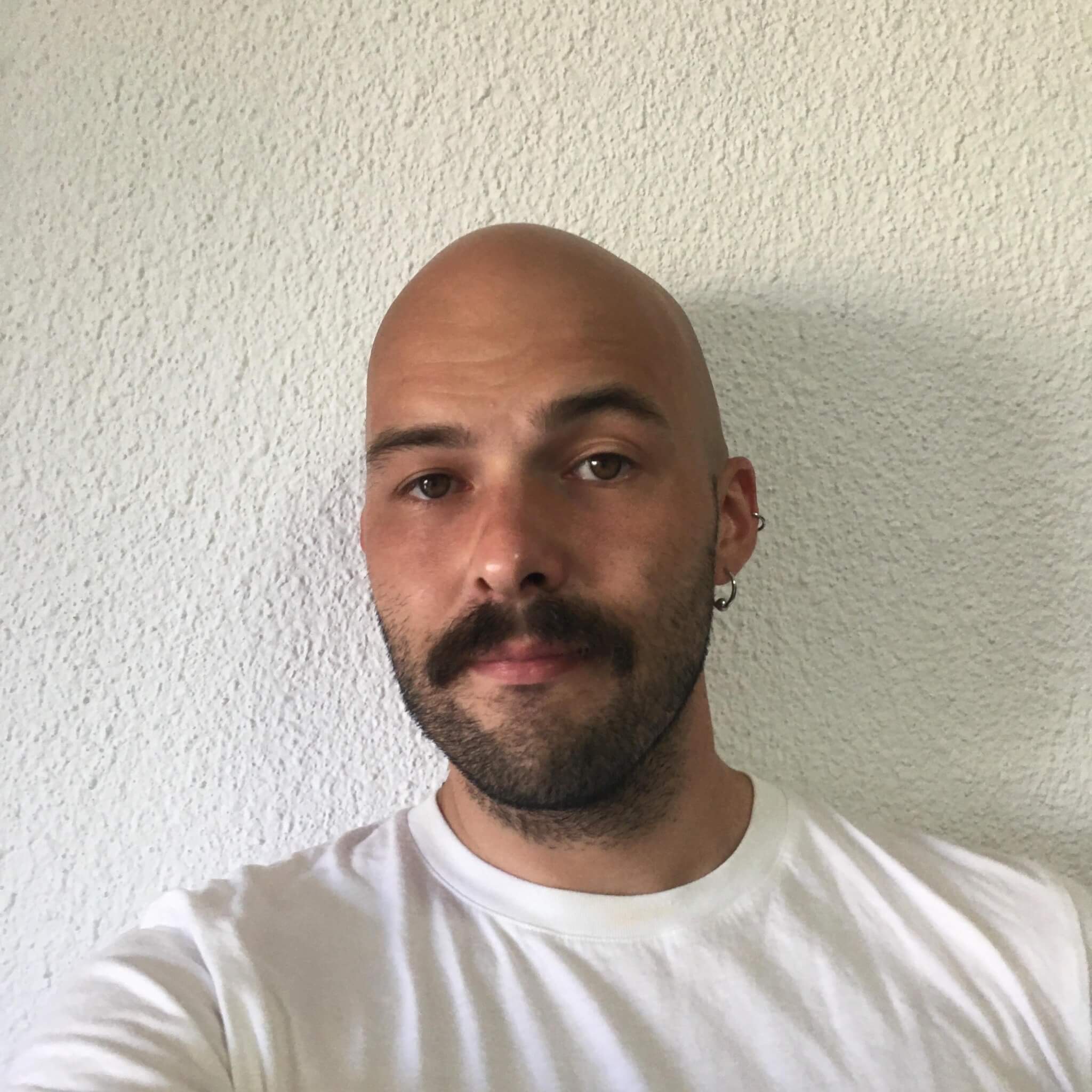How should Russia look after the end of the conflict according to you? Who will make possible democratic changes when the elites leave for emigration for a long time?
What is the future of Russia after the war?


- How do you see the end of the war in Ukraine?
- How should Russia look after the conflict?
- Should Russia dissolve to smaller states?
- Who will be Putin's successor?
- Who would you see as a potential leader of your country in the case of Putin's abrupt end?
- Could you briefly describe your experience of living in Russia at the moment? If you no longer live there, what are the reasons that prompted you to leave?
- Who will make possible democratic changes when the elites leave for emigration for a long time?
- How do you feel about the current mass emigration of Russian citizens?
Are there even people against the war in the Russian-speaking world? And if yes, who are they and can we trust them? These are the questions bothering Europeans and other people around the globe. This research sets out to prove that yes, there are, and attempts to find out what they look like, under a microscope.
In our research, we started with 5 in-depth interviews to better prepare for the quantitative stage. Based on these interviews, we designed a 10-minute survey to understand what opposition to the war in the Russian-speaking world looks like. We asked questions to understand:
- Their socio-demographic background
- Their outlook on the war and reasons for staying in or leaving Russia
- What they think, and hope, the future of Russia might look like
- Their social circle
- How does their ideal future of Russia look like
- How the war has affected them personally
- How they have acted after February 24th 2022
This way, we tried to capture a realistic and objective group portrait of war-opposed Russian speakers.
Why only survey people in opposition to war, you ask?
To start with, the goal of the research is to understand that yes, some Russians are against the war, and what they really think — to hopefully start a conversation based on mutual understanding between Russians and their fellows who want peace across the world.
Besides, a more general survey is technically difficult: many of the general public are afraid to be contacted by NGOs — let alone foreign ones — and this ends up skewing the respondents of the survey into the more extremes of society.
Who are our respondents?
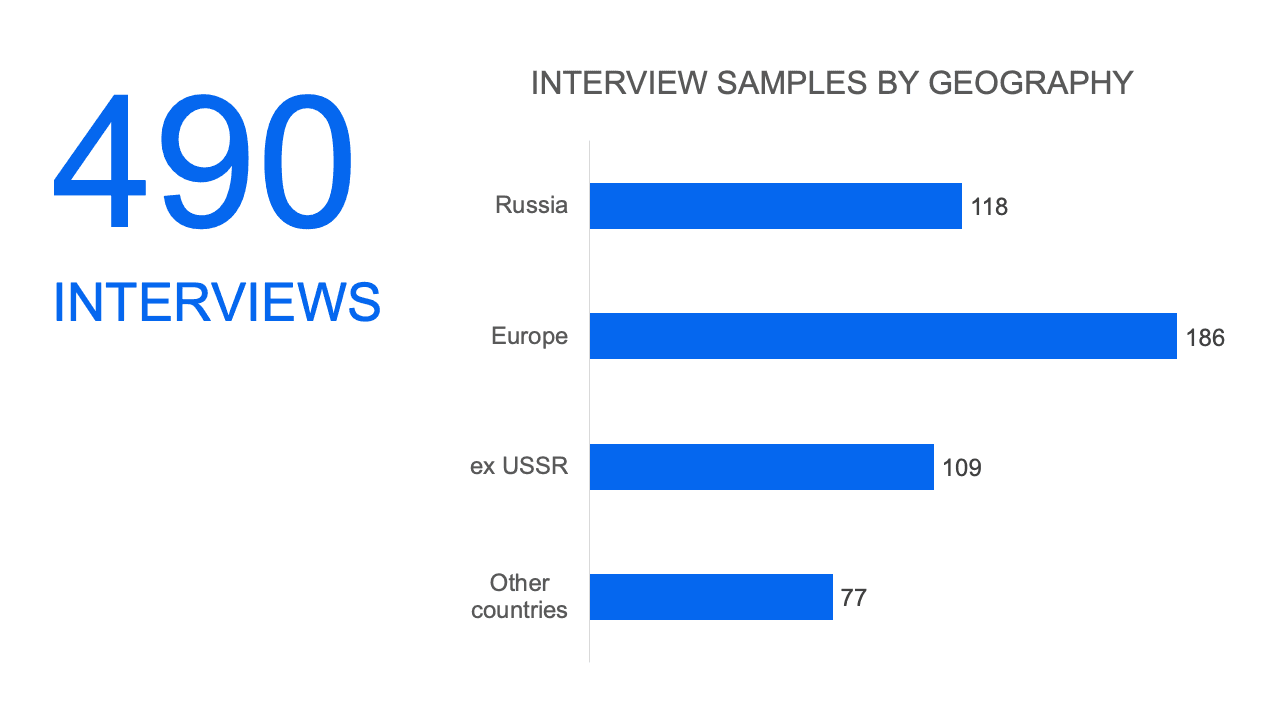
Interview samples by geography
In total, 490 people completed our questionnaire, among them 118 (24%) are in Russia. Among respondents outside Russia, most are in EU states, Switzerland or the UK, followed by ex-USSR countries, then the rest of the world.
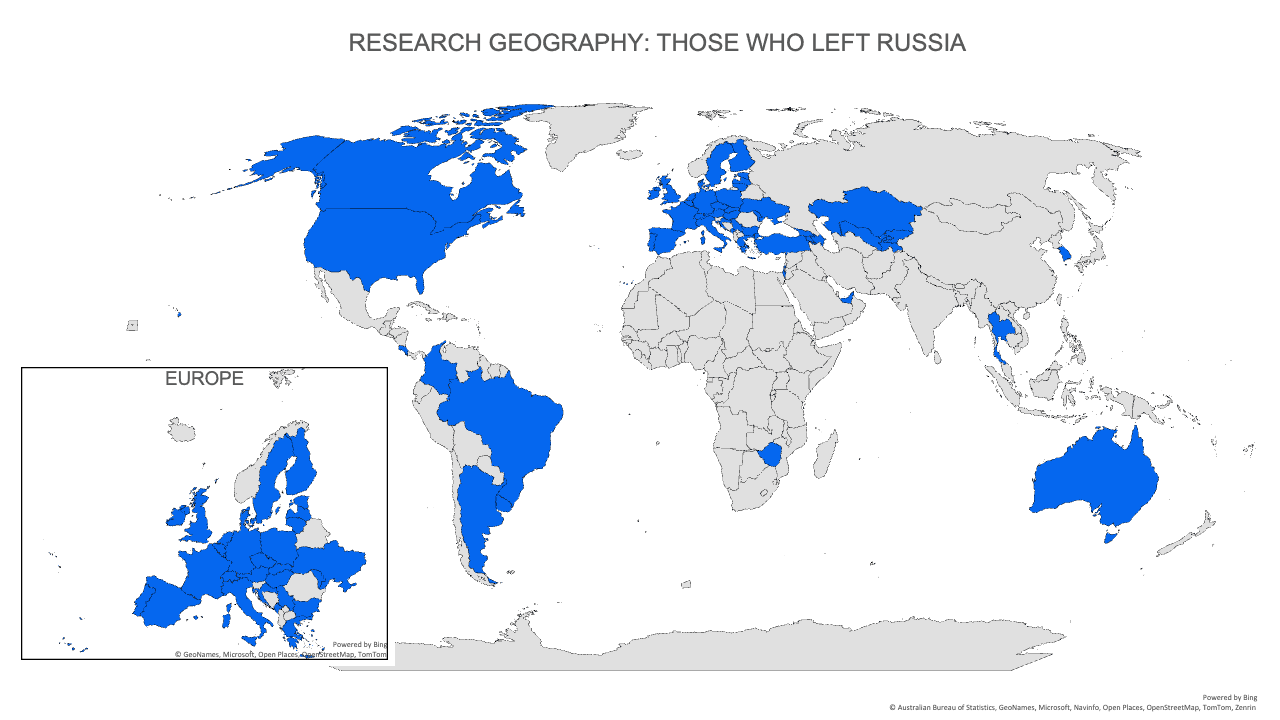
Research geography: Those who left Russia
Most of the respondents who are located in Russia are from the Moscow region and Saint Petersburg, while others reside in various cities across the country.
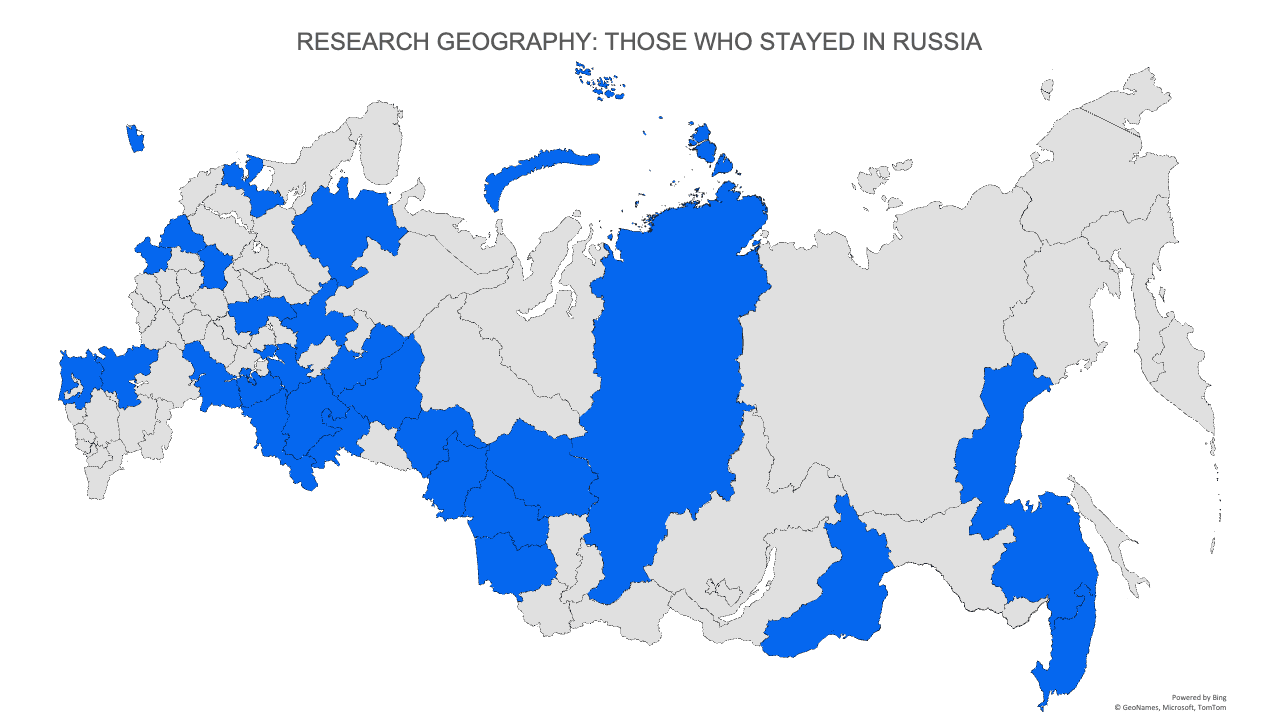
Research geography: Those who stayed in Russia
Our respondents are younger than the Russian population at large (based on Russian Federal State Statistics Service (Rosstat) data).
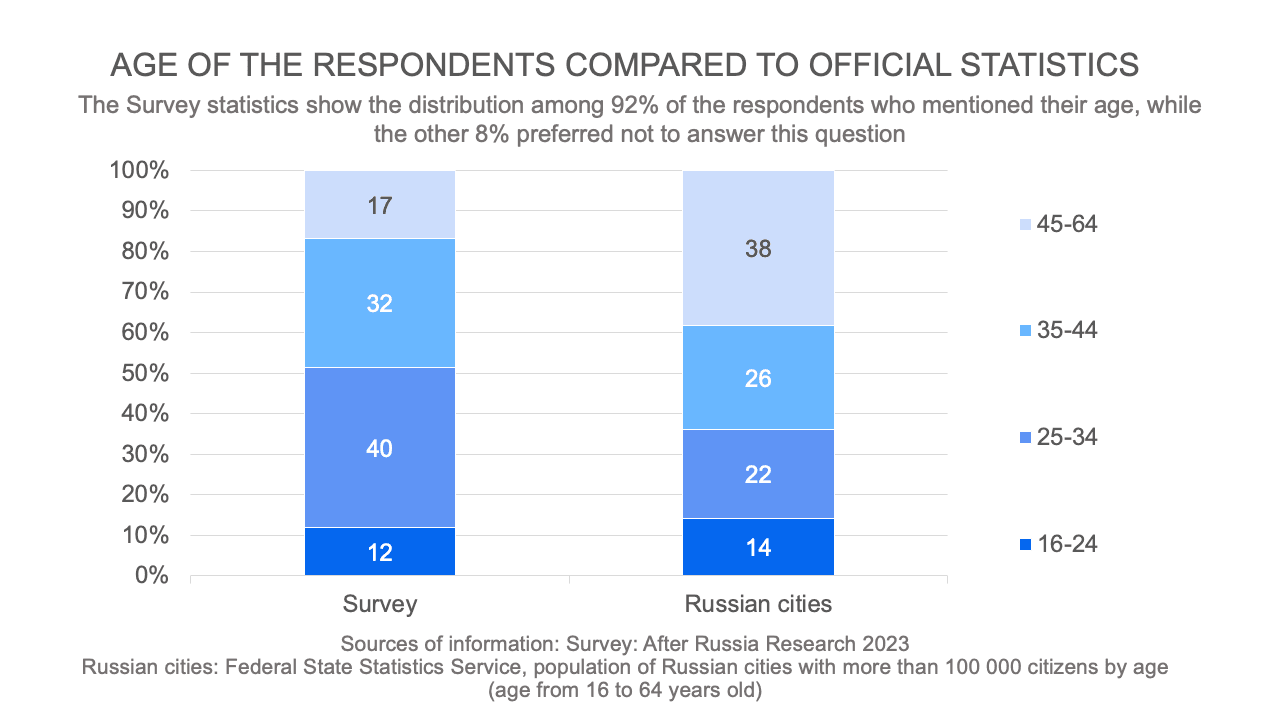
Age of the respondents compared to official statistics
We also found that our respondents are noticeably more educated compared to Rosstat, with 52% with a higher education degree and 28.5% with two higher education degrees. Compare this with the survey on Russia as a whole, where the figures are 47% and 4% respectively.
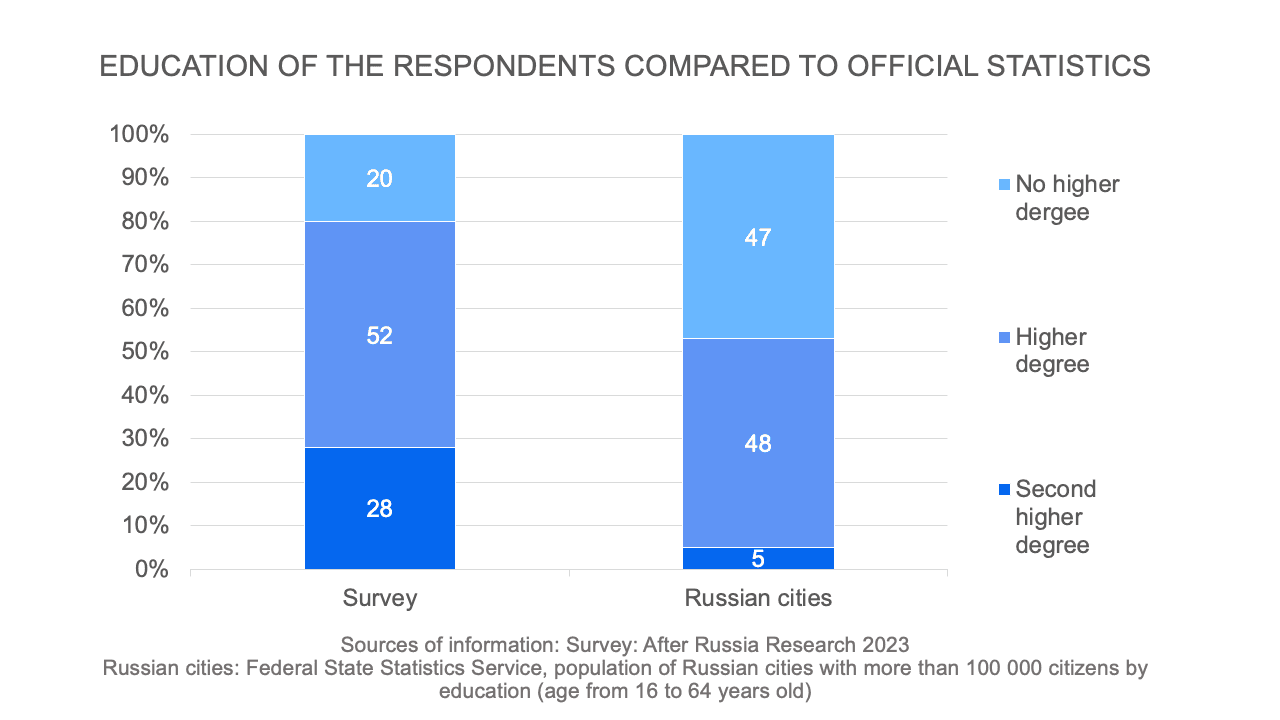
Education of the respondents compared to official statistics
Respondents to our survey are spread among both high-income and low-income groups. We also found that our respondents who belong to the low-income category are most likely to be high-school and university students.
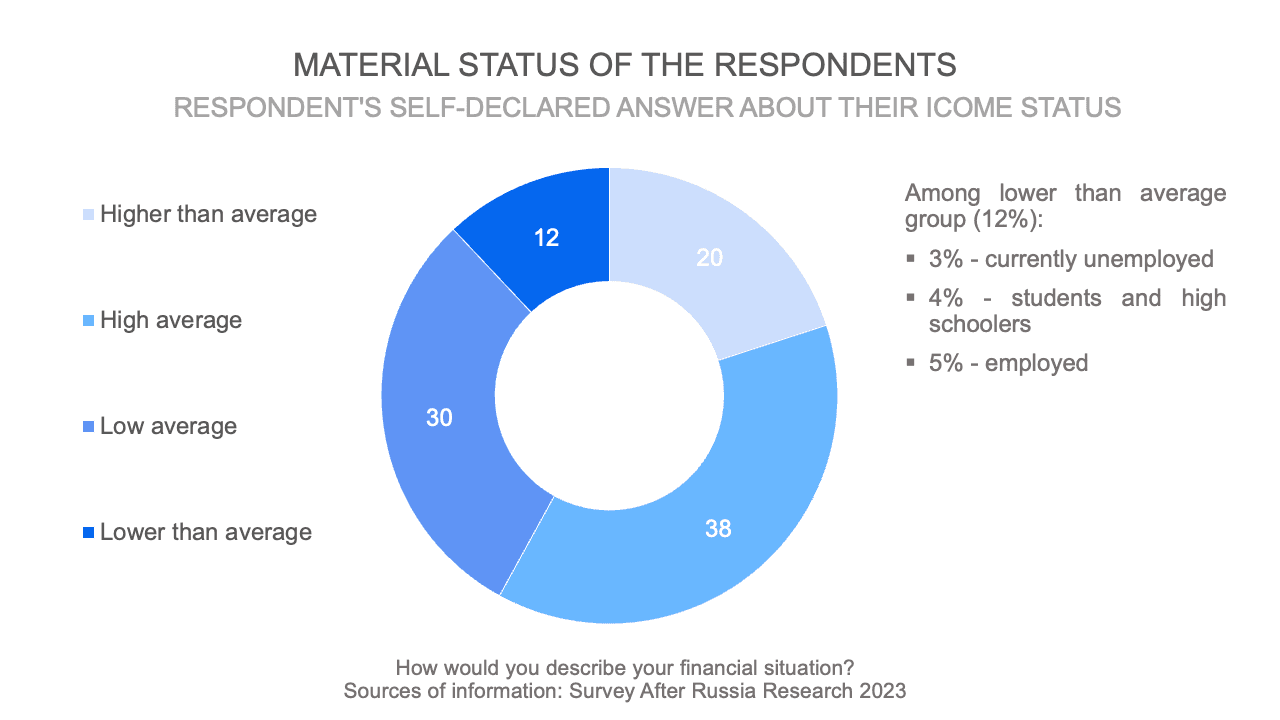
Material status of the respondents
Most of our respondents are currently employed and work in the IT and social service sectors.
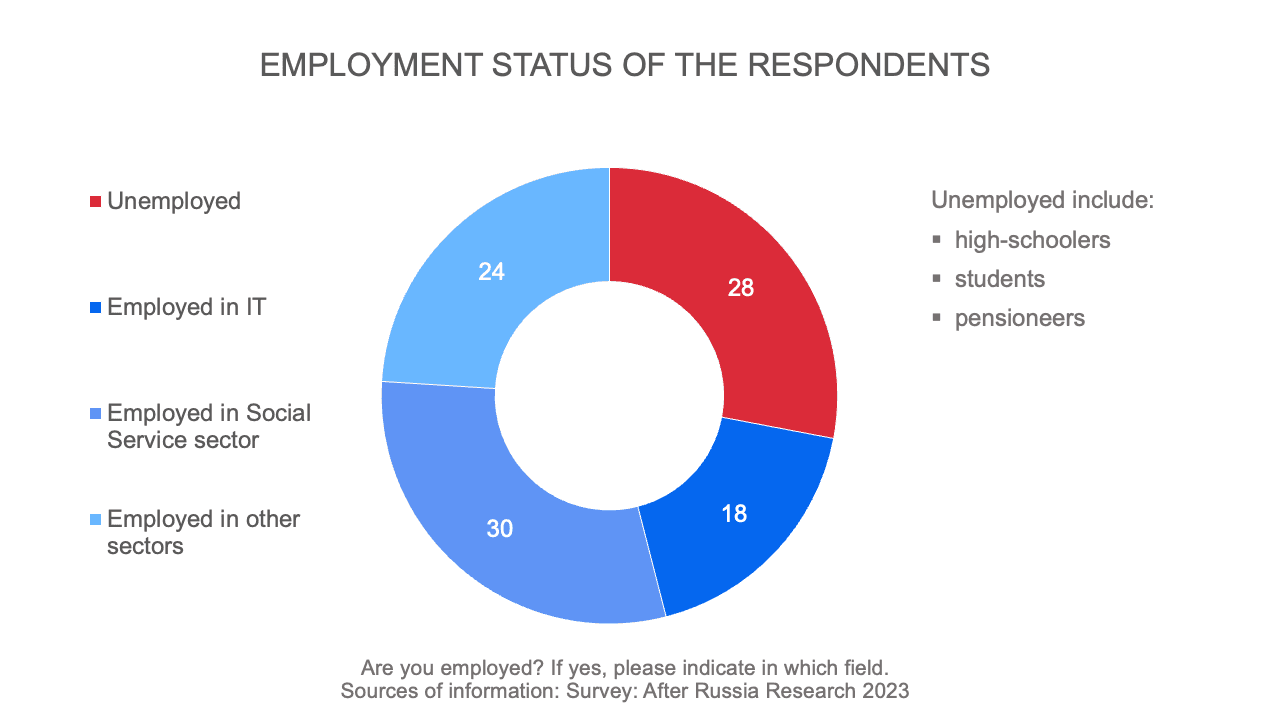
Employment status of the respondents
Respondent segmentation
Then, we segmented our respondents for further analysis. For this, we used 2 questions: the respondent’s current location and whether they take an active or passive stance on the war. Therefore, we segmented the respondents into four groups:
- Left Russia and explicit in their political views - 42% (204 responses)
- Left Russia and not explicit in their political views - 34% (168 responses)
- Live in Russia and not explicit in their political views - 18% (87 responses)
- Live in Russia and explicit in their political views - 6% (31 responses)
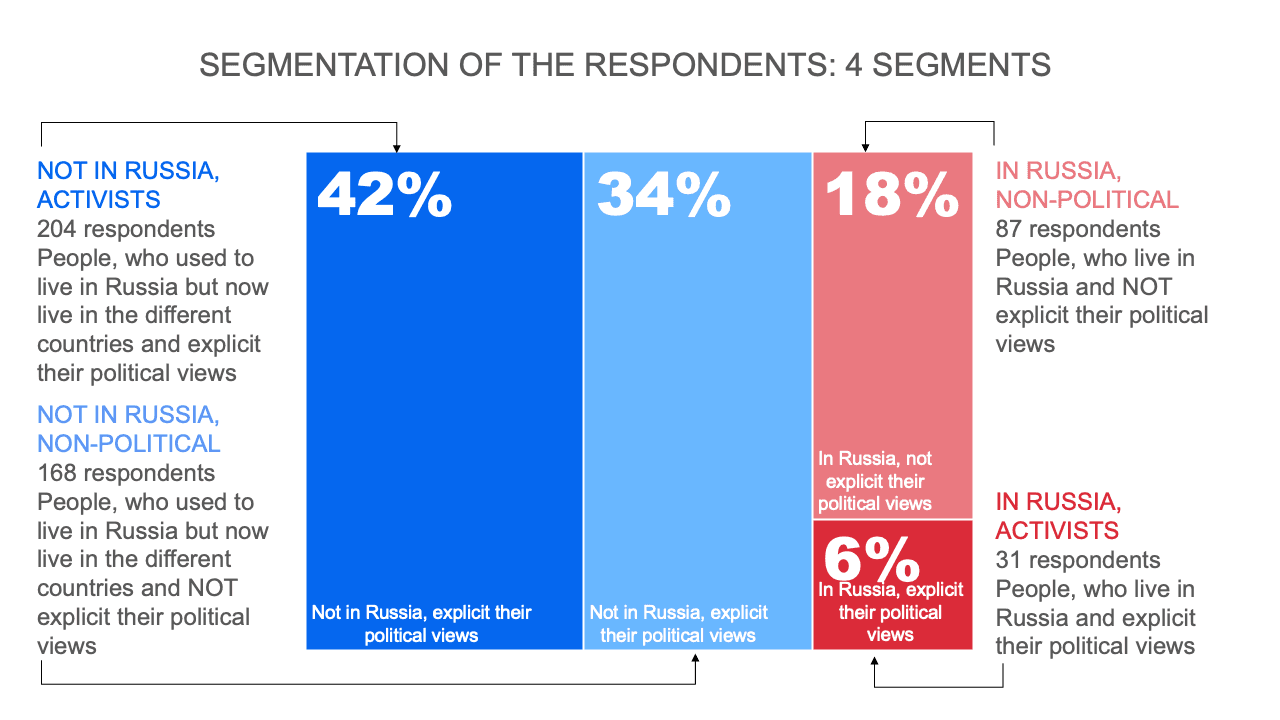
Segmentation of the respondents: 4 segments
Due to the small sample size of respondents who live in Russia and express their political views explicitly (not a big surprise considering that for almost any type of such expression you get find yourself behind bars), we merged the two segments of those who live in Russia into one with a total sample of 113 respondents.
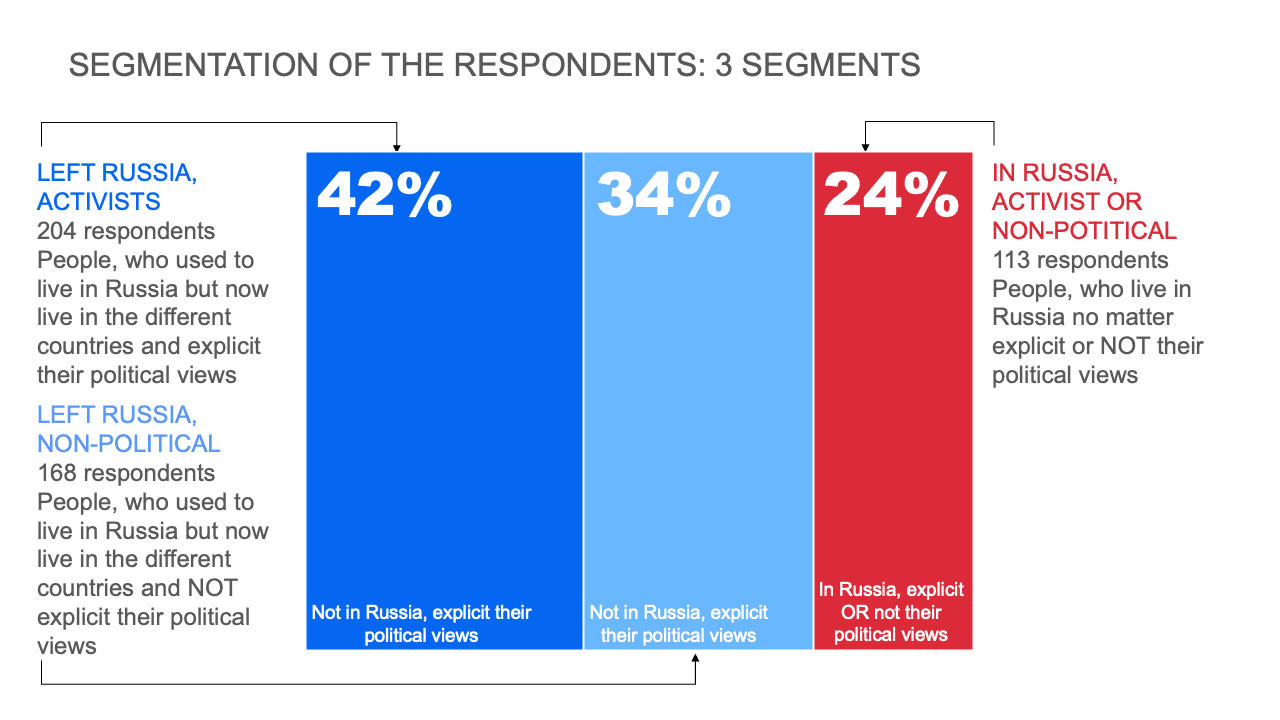
Segmentation of the respondents: 3 segments
There’s almost no difference between anti-war people who left Russia and those who stayed
When we see the divide on age, people of university age (16-24) tend to stay in Russia, and this is confirmed by the results on educational background: those who are going through school or university programs are more likely to stay, as students are not called up by conscription nor by mobilization.
In other categories, such as income and employment categories, the divide is less clear, showing that the respondents are spread among many walks of life.
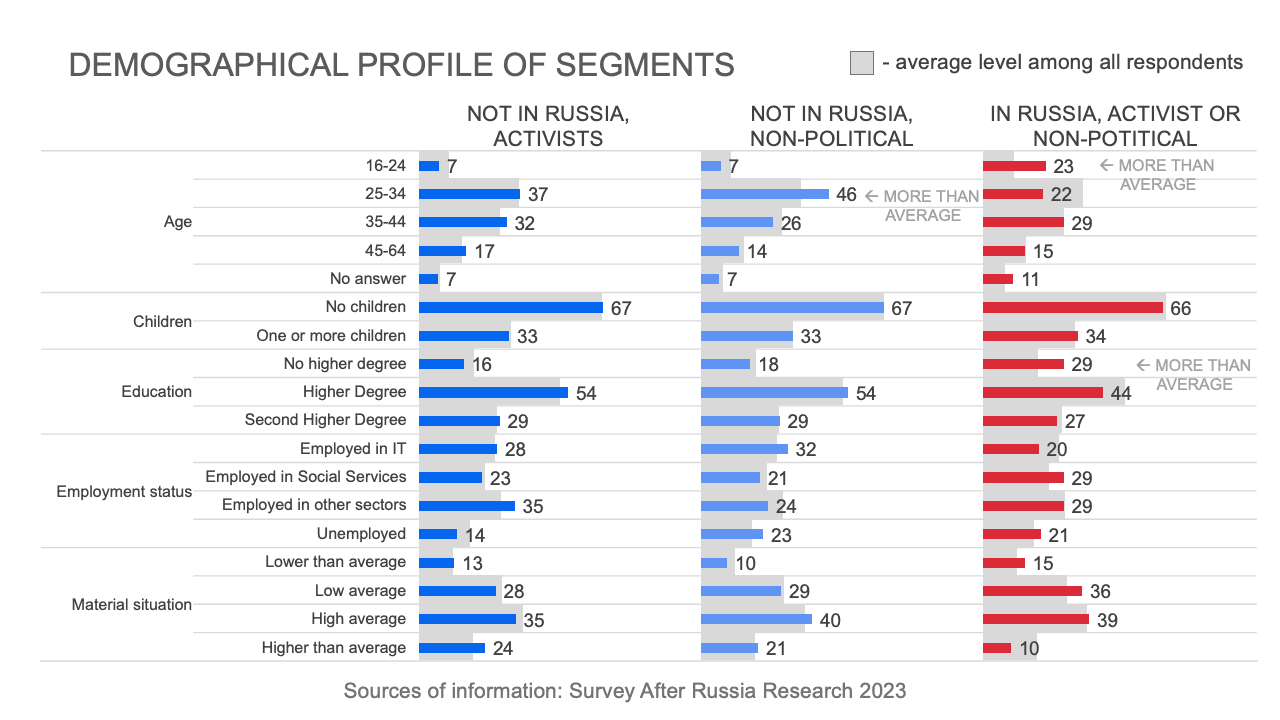
Demographical profile of segments
So what main conclusions did we find out about Russian speakers who are against the war?
Both those who left and those who stayed actively express their views, but it’s much more dangerous if you are in Russia
The people who actively show their stance are more prevalent among those who left — primarily those who migrated to European countries (EU member states, UK, and Switzerland). Those who left and count themselves as actively against the war are more likely to attend pacifist rallies both in Russia and abroad, express anti-war views on social media posts, and send humanitarian support to both Russians and Ukrainians.
I would openly state my views if it weren’t punishable by jail time. I would get on the street, vote, and spread information.
I am ready to openly express my opinion if it does not entail prison terms, ready to take to the streets, vote, and disseminate information
People who do this also exist among those who stay — practically everyone discussed their position with the people around them and expressed it one way or another. However, due to the small sample size, we cannot responsibly compare them based on these statistics. But one thing is indicative — many people in Russia hesitate to answer what have they done to show their position.
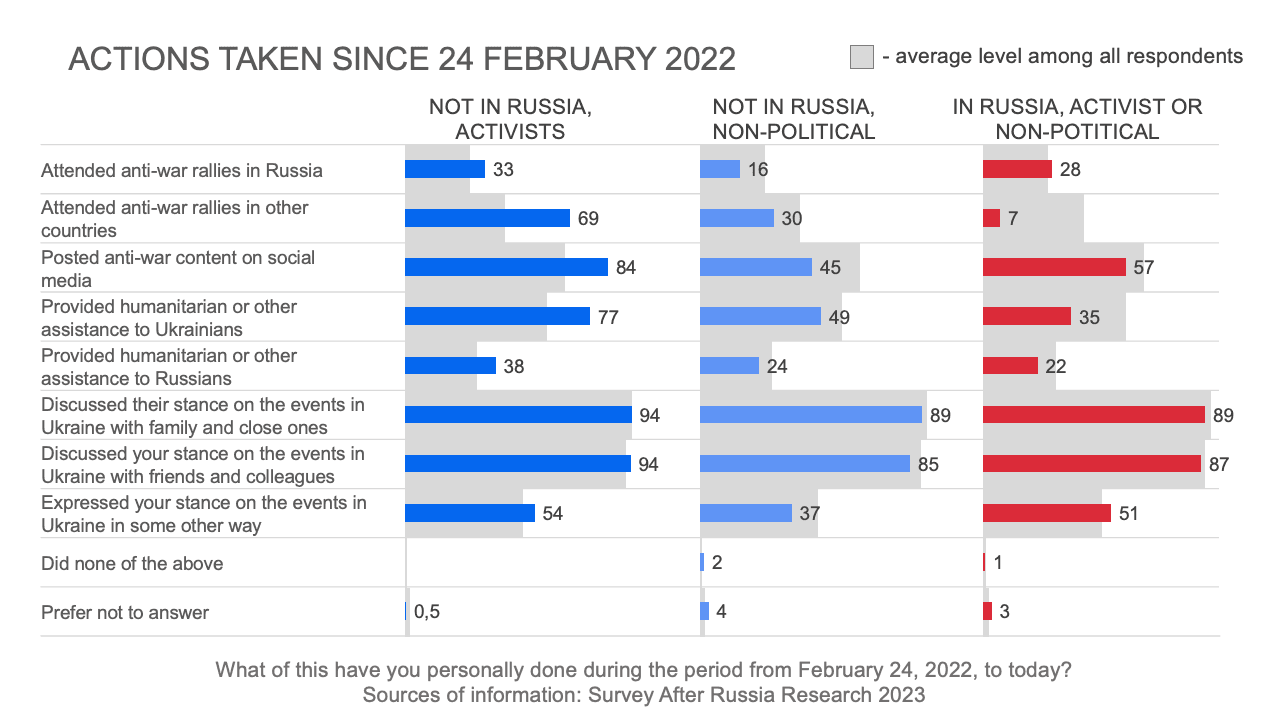
Actions taken since 24 February 2022
Brain drain
Furthermore, those who leave Russia don’t plan to return if nothing changes in the political situation in Russia. Considering a significant proportion of high-income well-educated people about those leaving Russia, this is undoubtedly a new wave of “brain drain”, making Russia’s democratic future more difficult to achieve.
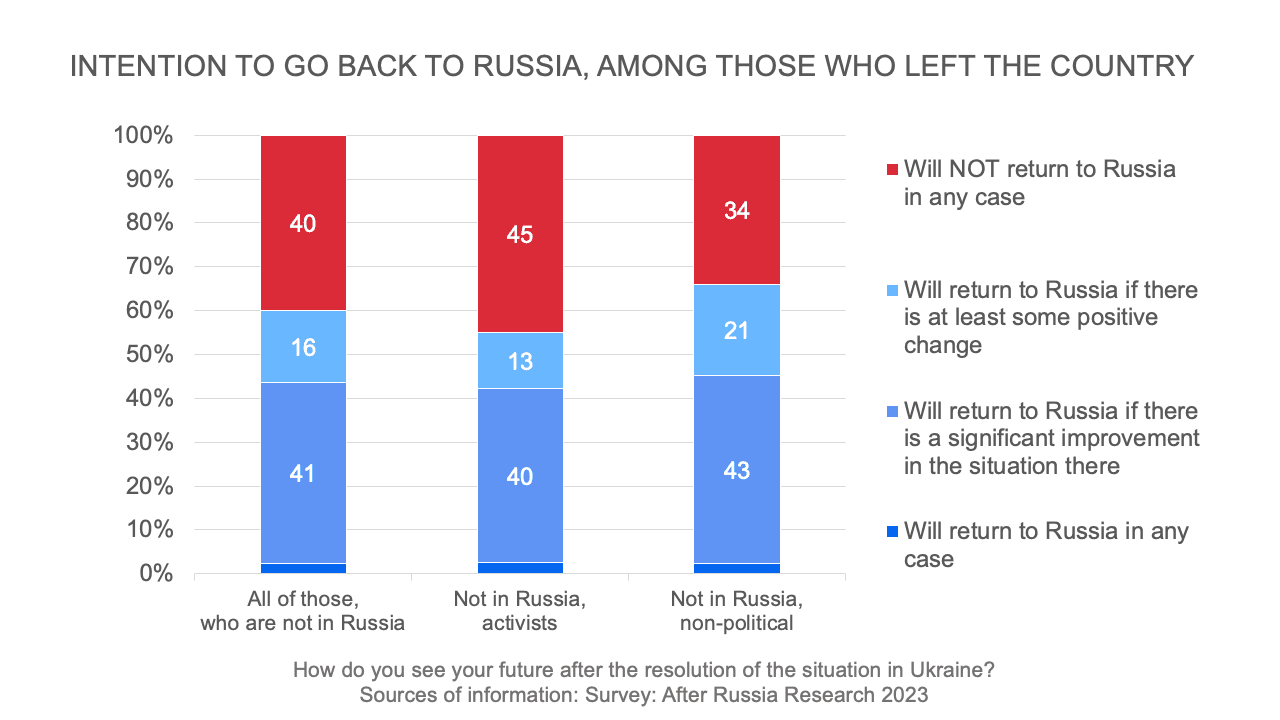
Intention to go back to Russia, among those who left the country
You cannot get out of a deep crisis in six months. The war highlighted problems in all sectors of the economy. Experts who could’ve solved these problems leave the country. It would take years to have new experts, and we wouldn’t have them with the current educational system in Russia.
Because emerging from a deep crisis doesn't happen in half a year. The war highlighted problems in every sector of the economy. Specialists who could address these issues are leaving the country. Training new ones takes years, and not under the current education system in Russia.
Wishing is not believing
An absolute majority of the respondents want a total victory for Ukraine, which also implies the return of not only the territories occupied by Russia since February 2022 but also Crimea. They also think that the scenario in which Russia gains victory in the near future is the worst scenario possible.
I would love to believe that the scenario in which Ukraine gets back all its territories will come true. But I’m afraid that objectively it will be very difficult, because Russia still has so many weapons and Crimea is so important to the (Russian) regime. I even think that an internal conflict in Russia, in which Crimea strives to some independent status, is more likely
However, very few actually believe that the war will end up how they think it should — 57% think that the conflict will stretch for an unknown period, with no significant changes to the frontline.
On top of that, almost everyone surveyed wishes for a new president, a new government, and to move towards democracy — though no one thinks this is a likely scenario.
I don’t want to believe that Putin will stay in power or that the political direction won’t change, but I don’t really believe in the democratization of Russia either.
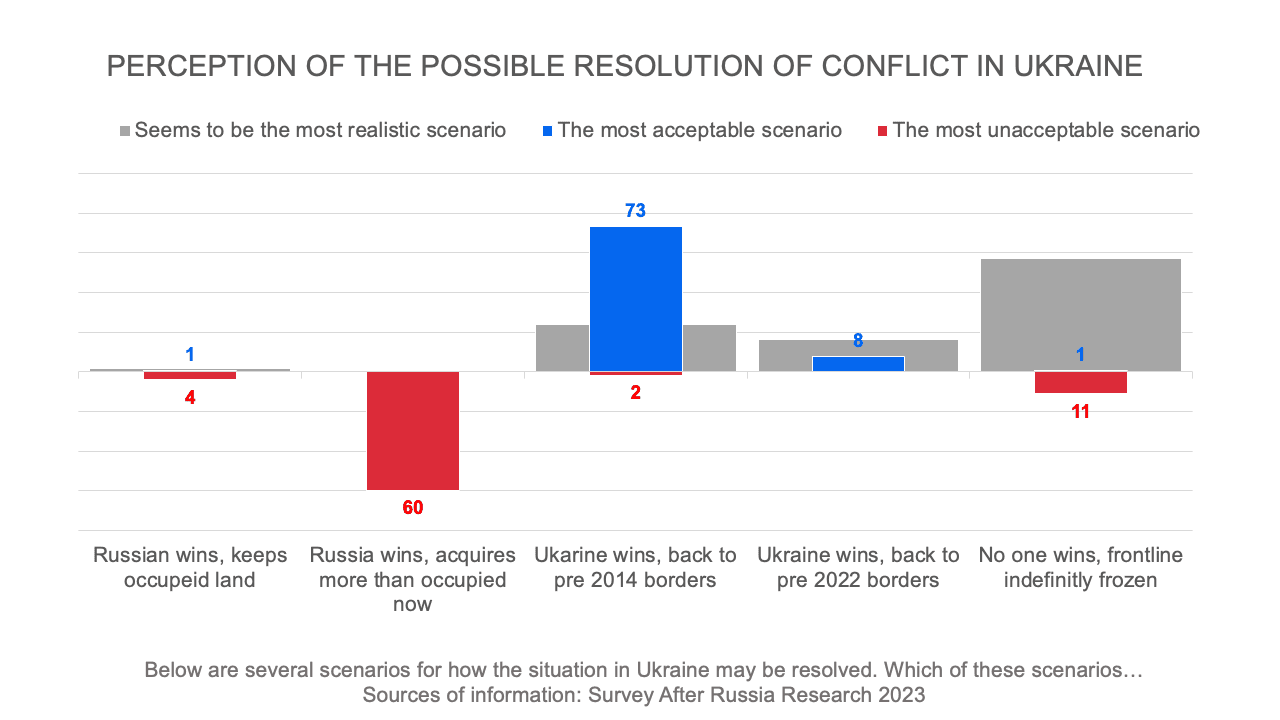
Perception of the possible resolution of conflict in Ukraine
The surveyed Russian emigrants don’t necessarily leave for a better life…
Some may think that Russian emigrants leave and find a better life and that the war is just an excuse, feigning opposition to the regime and war. However, our research has shown that this is not necessarily true — among our respondents, only about a quarter answered that they emigrated to find a better life.
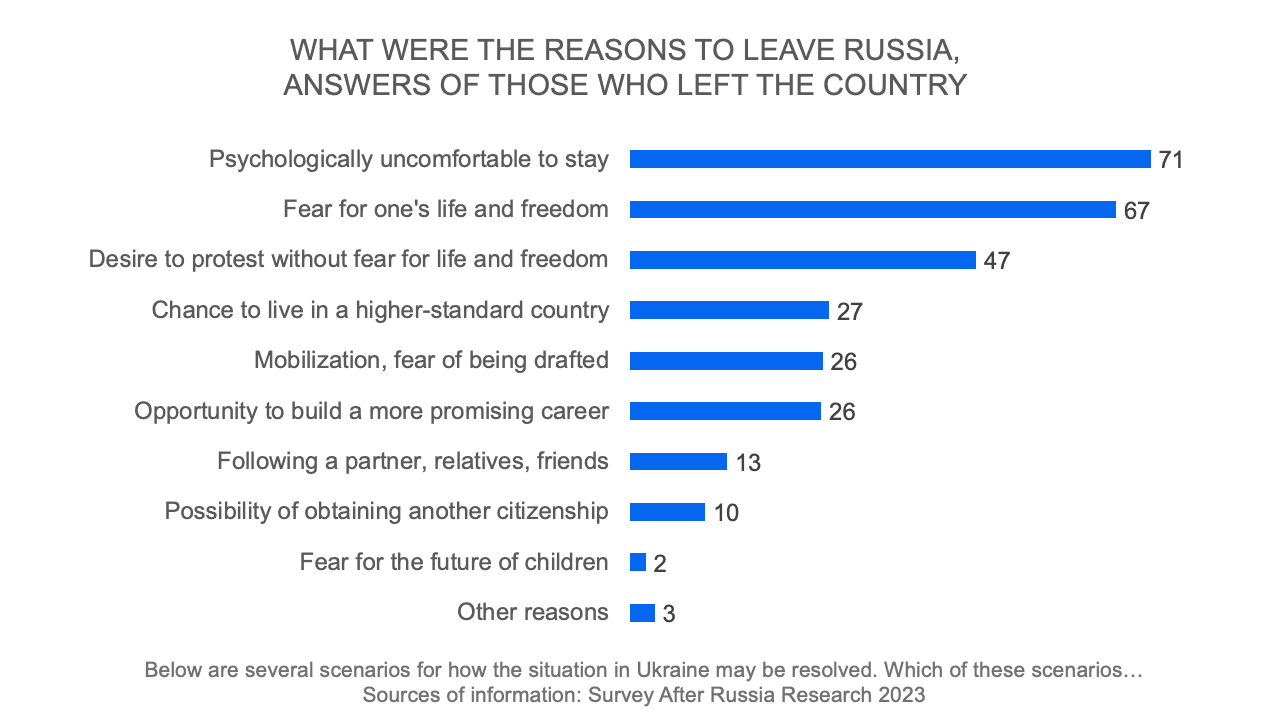
What were the reasons to leave Russia, answers of those who left the country
The most common reasons for leaving Russia are:
- emotional stress,
- fear for their lives and freedom,
- and opposition to the regime as reasons for emigrating.
Furthermore, fear of mobilization is cited as a reason among age groups eligible for conscription and/or mobilization.
… And don’t necessarily get a better life abroad…
In fact, our respondents who moved abroad lost part of their social circle — and therefore, support — due to both political disagreements and the migration process itself. They also report that while they may be used to planning their life before the war started, moving abroad has made long-term planning extremely difficult, as the legality status of their stay and financial condition in their new country can get unstable.
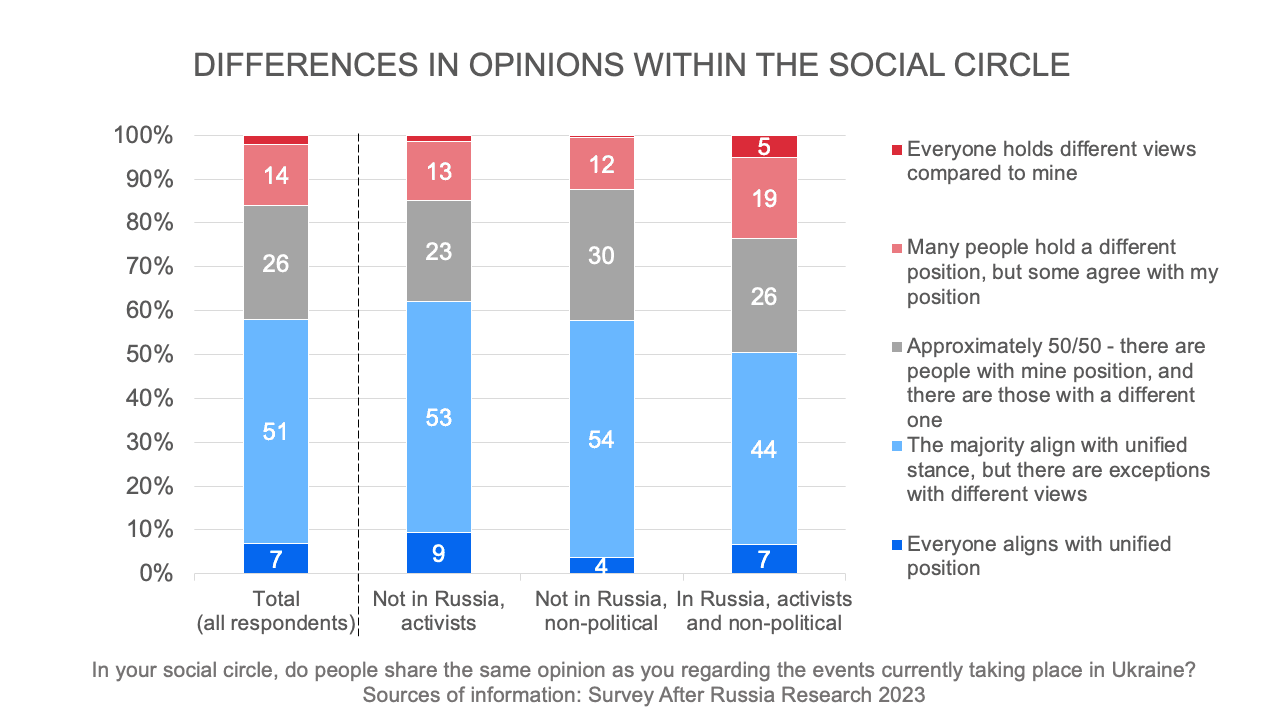
Differences in opinions within the social circle
What’s next?
What you have just read was just an outline of a research. There’s much more data there – from social-demographic factors analytics to the analytics of open-ended questions, where people explain, why exactly the do or do not believe in a certain future scenarios. It is an invaluable data, that can uncover insights into how can we work further with such an audience and give us all a chance for a safer future.
Our hope, and the reason why we designed and carried out the research, lies in an honest belief that dividing humans by their palace of birth or their passport is such a 19th and 20th century. Arguably, such approach to “Us VS. Them” dichotomy is what brought this war and many other military conflicts. We believe that the road to a more safe and inclusive future is paved by how we define “Us”. Our research shows, that there are Russians who are ready for change, who are not supportive of Putin’s regime at all, and who are ready to work togather to build a better future. We hope they will find understanding and support in this journey.
- We should rewrite the conclusion in terms of the tone - it feels too opinionated.
Our respondents are younger than the Russian population at large (based on Russian Federal State Statistics Service (Rosstat) data).- please provide a link to the source, even if in Russian- Please next time ask 1 question only (and ideally in a bit shorter phrasing)
Related articles
Kysh (Andrey)
...do not give up and do not despair, do what you think is the right thing to do. Russia will definitely be free.
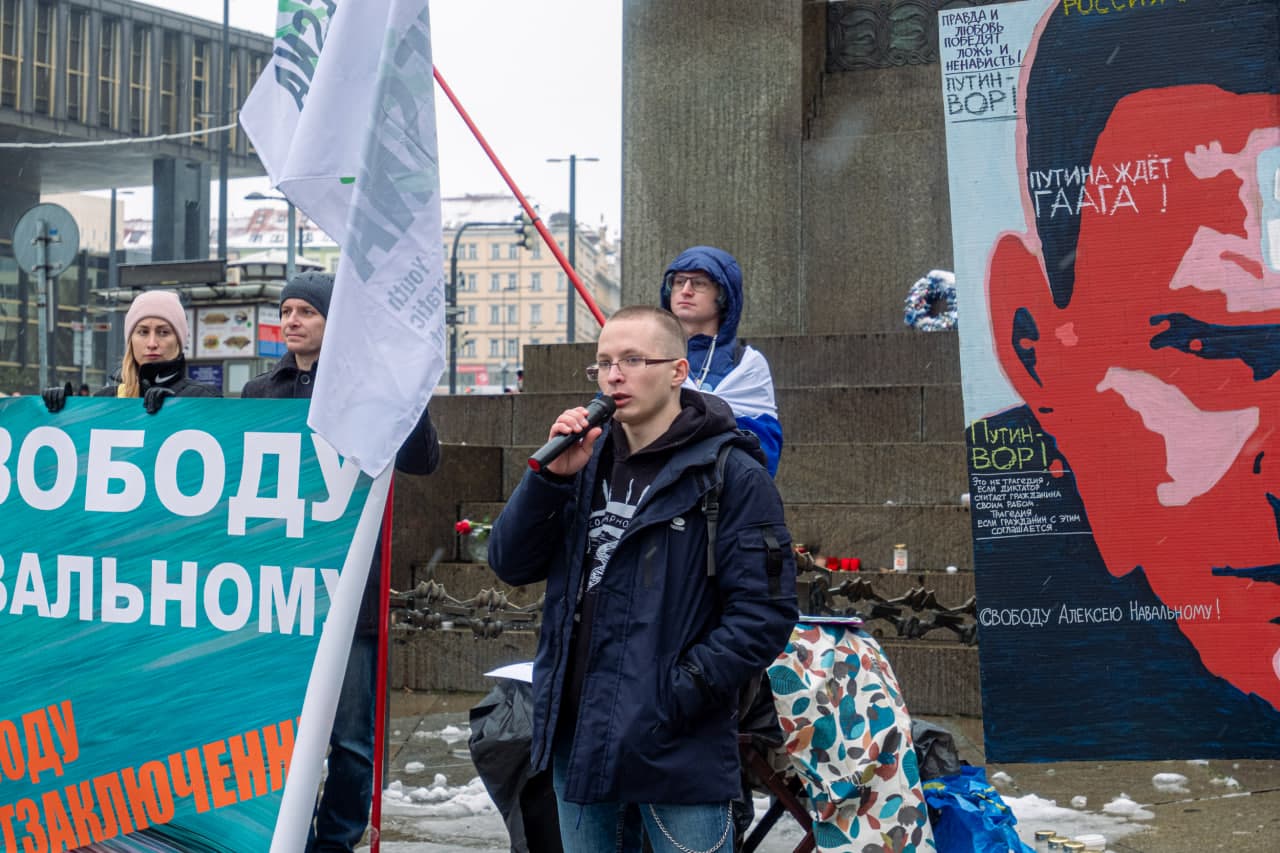
Russia and Ecology (part 2): What does the public think?
In part 1 we've covered the state position to economy. What is the stand of the public?
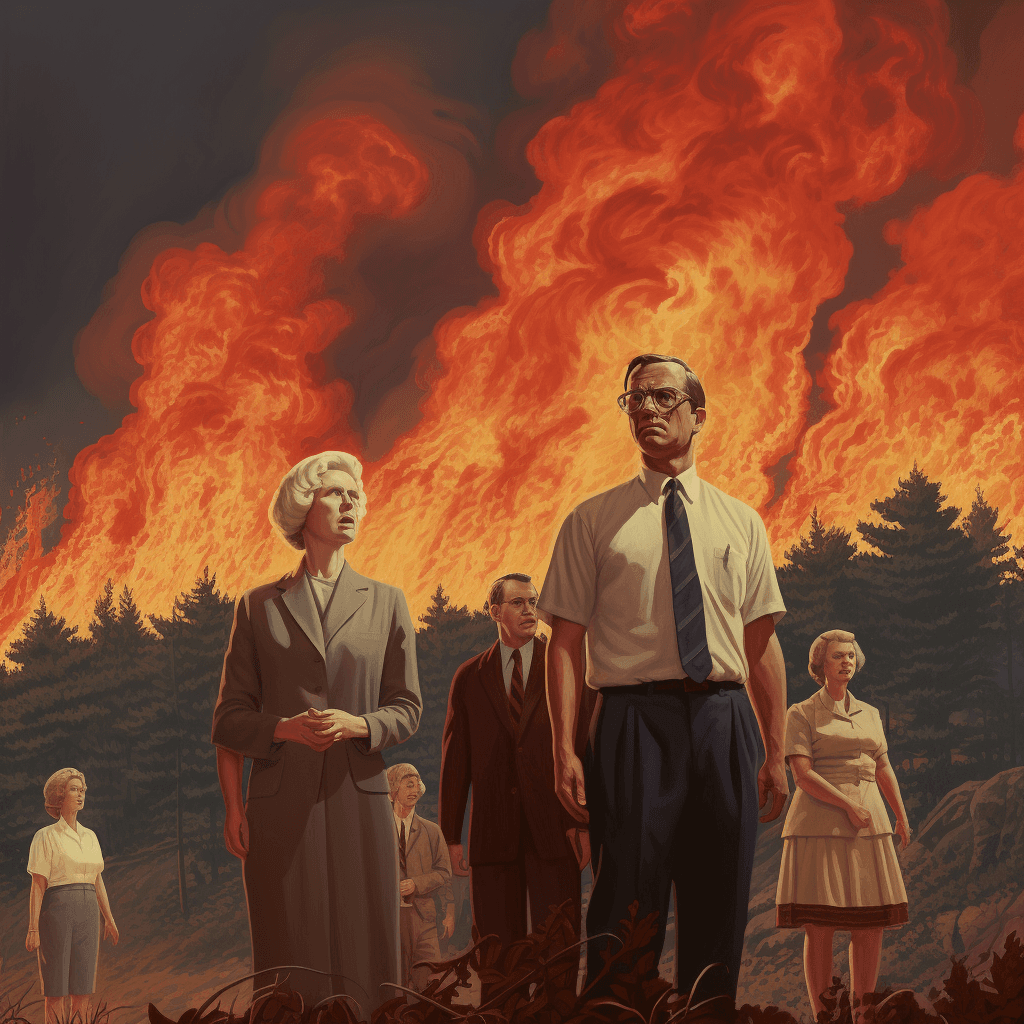
Pro-Russian Regime Sentiments in Germany
How to explain support for Russia in German politics

Support us
Our media platform would not exist without an international team of volunteers. Do you want to become one? Here's the list of currently opened positions:
- TypeScript developer for Ask a Russian
- Czech translators
- Editors for Ask a Russian
- Social media managers
- Writers
- Translators
- Interviewer
- Fundraisers
- Social researchers
- SEO Specialist (technical)
- Graphic designers
Is there any other way you would like to contribute? Let us know:
We talk about the current problems of Russia and of its people, standing against the war and for democracy. We strive to make our content as accessible as possible to the European audience.
Do you want to cooperate on content made by the Russian standing against the war?
- Our team of writers, journalists and researchers will be happy to cooperate with you on new content.
- As our content is under creative commons, we are able to allow you to publish it on your platform (with attribution).
We want to make people of Russia, who stand for peace and democracy, heard. We publish their stories and interview them in Ask a Russian project.
Are you a person of Russia or know someone who would like to share their story? Please contact us. Your experience will help people understand how Russia works.
We can publish your experience anonymously.
Our project is ran by international volunteers - not a single member of the team is paid in any way. The project, however, has running costs: hosting, domains, subscription to paid online services (such as Midjourney or Fillout.com) and advertising.
Our transparent bank account is 2702660360/2010, registered at Fio Banka (Czech republic). You can either send us money directly, or scan one of the QR codes bellow in your banking app:
10 €

20 €

40 €

60 €

Note: The QR codes work only when you scan them directly from your banking app.
Our stand on the Russian invasion to Ukraine
Russia started the war against Ukraine. This war is happening from 2014. It has only intensified on February 24th 2022. Milions of Ukrainians are suffering. The perpetrators of this must be brought to justice for their crimes.
Russian regime tries to silence its liberal voices. Russian people against the war exist - and the Russian regime tries its best to silence them. We want to prevent that and make their voices heard.
Connection is crucial. The Russian liberal initiatives are hard to read for European public at times. The legal, social and historical context of Russia is not always clear. We want to share information, build bridges and connect the liberal Russia with The West.
We believe in dialogue, not isolation. The oppositional powers in Russia will not be able to change anything without the support of the democratic world. We also believe that the dialogue should go both ways.
The choice is yours. We understand the anger for the Russian crimes. It is up to you whether you want to listen to the Russian people standing against this.
